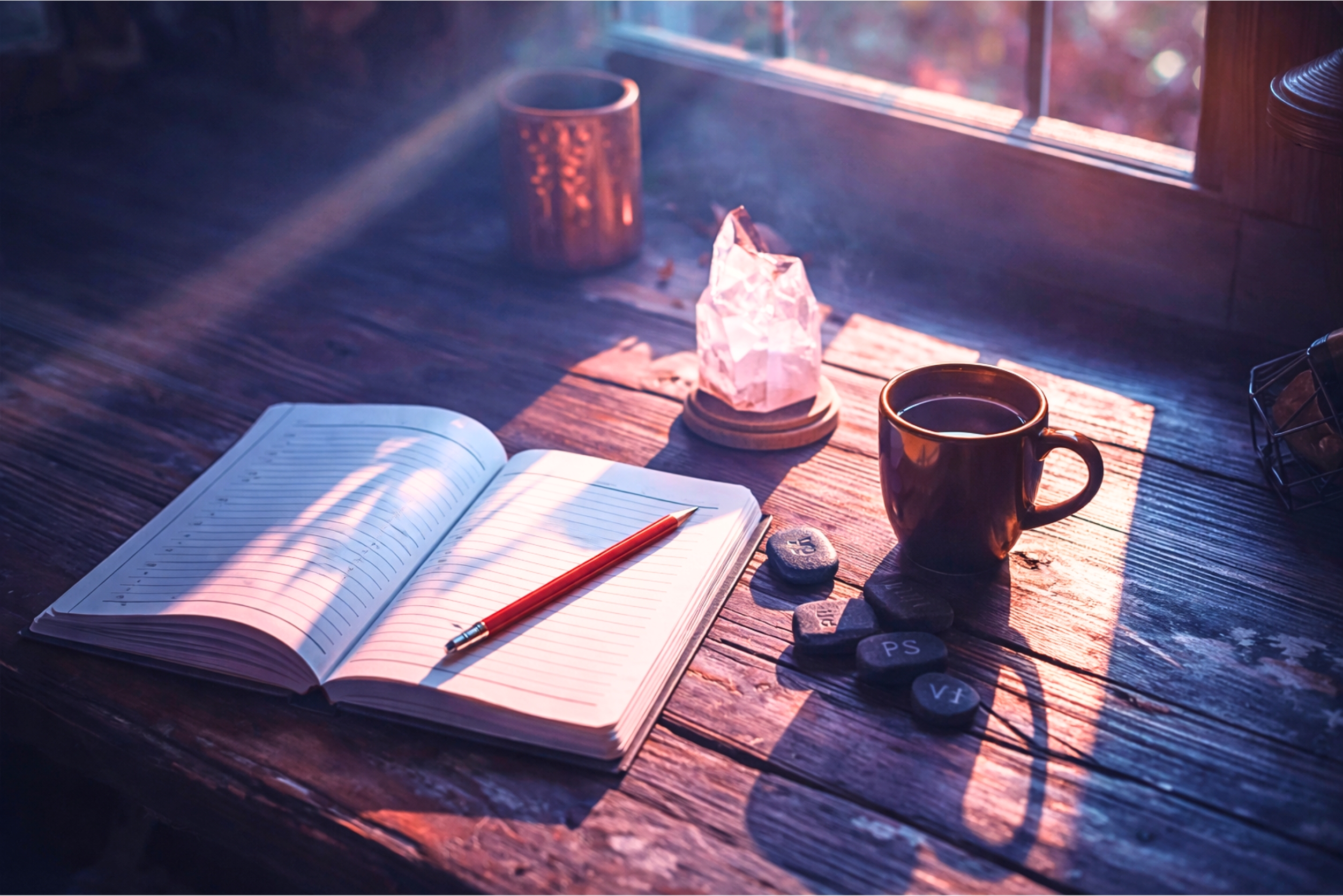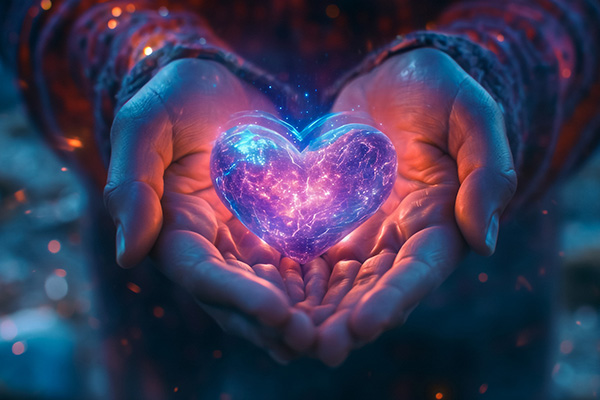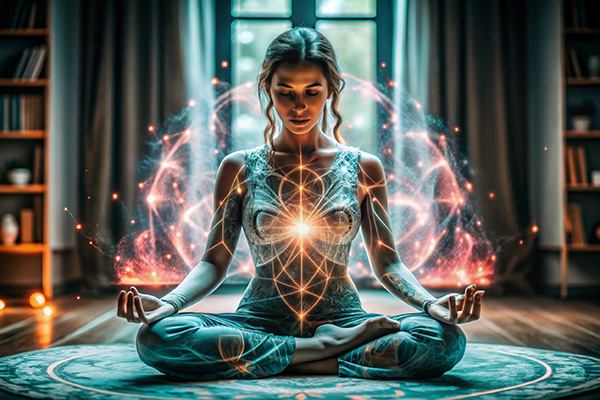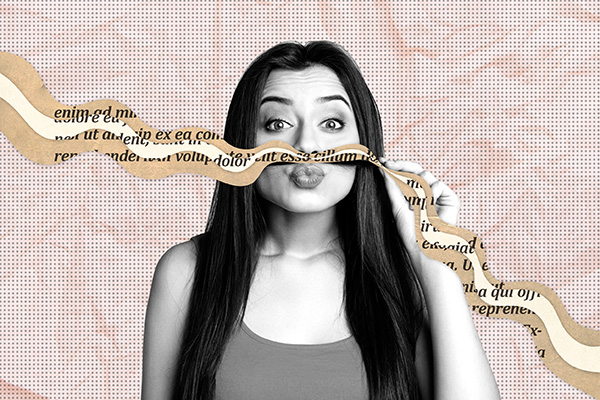spiritual self-help
Navigating Grief Without Losing Yourself
 In my work as a psychic reader, I have worked with many people navigating grief. Over the years, I have witnessed how people process loss and transition differently.
In my work as a psychic reader, I have worked with many people navigating grief. Over the years, I have witnessed how people process loss and transition differently.
I have often had to guide clients toward grounding, self-trust, and setting compassionate boundaries. And, as life would have it, I recently had to draw on that wisdom and apply it to my own family.
My father was recently admitted to hospice care at his local nursing home after spending a week in the hospital. His prognosis was poor.
As our family transitioned to this new phase of care, I stayed in touch with loved ones and made decisions centered on his comfort and dignity.
At the same time, I made a conscious effort to protect my emotional energy and maintain healthy boundaries so that I could stay grounded.
In these circumstances I’ve been grappling with a kind of grief that isn’t often acknowledged: the grief of realizing someone you love is no longer the person they once were.
Even when they are physically present, the relationship shifts. There can be a quiet heartbreak in adjusting to the present while remembering the past.
There is also grief in watching a family reorganize itself. During times of transition, long-standing dynamics often change. Some family connections deepen and some relationships no longer operate as they once did. This can also feel like a loss in terms of shared understanding and how things “used to be.” Sudden changes in family circumstances tend to reveal where everyone actually stands.
Why This Rune Reader ‘Reverse Plans’ Her Day
 If you’d asked me a few years ago how I welcomed a new day, I would’ve rattled off a checklist: what needs to be done, what must be scheduled, what’s urgent and what’s not. I thought a structure schedule and curated life was strength. I believed that manifesting my future meant controlling it before it even arrived.
If you’d asked me a few years ago how I welcomed a new day, I would’ve rattled off a checklist: what needs to be done, what must be scheduled, what’s urgent and what’s not. I thought a structure schedule and curated life was strength. I believed that manifesting my future meant controlling it before it even arrived.
But somewhere along my spiritual path, I began to dance to a different rhythm. It was a kind of sacred tempo that doesn’t rush or demand. That doesn’t forecast before it senses and feels.
Today, I want to share that magical alternative rhythm with you. I call it reverse planning. It’s not a rigid system, but an invitation to trust time the way a rune whispers its truth.
Our modern culture tends to treat calendars like hammers. We use them to nail down the future with agendas, meetings, goals, and deadlines. On paper, life appears orderly, efficient, and decided. But for many of us, that creates a low-level anxiety that’s hard to name.
We wake up already carrying the weight of what hasn’t even happened yet. The day feels predetermined before we’ve had a chance to participate in it.
As someone who reads runes, symbols that speak across the ancient thresholds of time, I’ve come to believe that true guidance rarely comes in the form of a command. Instead, it arrives quietly, in the pauses, in the spaces between breaths. That’s where reverse planning begins: with presence, not pressure.
Your Sacred Center Of Self-Love
 We all thrive on being loved. This is natural, of course, if you look back at humanity in history on an evolutionary level. Ancient people came together in tribes, families, and groups, to cultivate a place of safety, security, nurturance, and love.
We all thrive on being loved. This is natural, of course, if you look back at humanity in history on an evolutionary level. Ancient people came together in tribes, families, and groups, to cultivate a place of safety, security, nurturance, and love.
If you were different or stood out in any way, or even left the tribe, you were literally putting your own life at risk. This topic can be viewed from so many arenas, including psychological, spiritual, scientific, and psychic.
I often wonder how and when did we start defining ourselves by how others felt about us, and why did we believe that other’s thoughts about us were true? At what point in time did we allow others to define us? It’s as though we as humanity went into a deep trance.
We all know the phrase, “Love thyself first”. When did we forget this vital piece of information?
There are many ways we can come back in touch with this essential truth, but for the most part, our society does not support a lifestyle that would naturally lead us back to our sacred center of self-love.
How often do you take a moment to look in the mirror, or tell yourself, “I love you?” Most of us feel silly doing this, but it is very healing.
Have you ever met an older person who behaves in ways that are foolish or who just doesn’t give a hoot what anyone else thinks? My paternal grandfather used to throw dinner rolls across the table at me in fancy restaurants. While my parents and other family seated at the table would roll their eyes at my Grampy, I used to laugh hysterically!
The Empowered Empath’s Guide To Spiritual Self-Care
 Empaths, sensitives and intuitives tend to be givers. Loyal, sometimes to a fault, and fiercely protective of those they care about… moving at lightning speed whenever called upon.
Empaths, sensitives and intuitives tend to be givers. Loyal, sometimes to a fault, and fiercely protective of those they care about… moving at lightning speed whenever called upon.
So, when I say to an empath that it may be time to put themselves first, the response is often mixed.
But, if putting yourself first seems too selfish or too difficult, try something simpler: at least put yourself on an equal footing with those you love and care for.
For many sensitive and highly intuitive people, self-care must be an acquired behavior… and it’s a big one. Empaths intend to be selfless, to help, heal and facilitate those they care about. Wonderful!
But remember, if this is your goal, then begin with yourself. The stronger, healthier and happier you are then the more effective, nurturing and supportive you can be to those around you.
Putting yourself first doesn’t mean that you are doing only what you want to do all the time, and it doesn’t mean that you are suddenly going to ignore those you care about.
What it does mean is making it a priority to take care of your own physical, mental, emotional and spiritual needs. This can be a tall order and quite the task for some empaths. Don’t wait until you are in a meltdown… frustrated and snapping at everything and everyone around you, with little or no provocation.
What Horses Teach Us About Freedom And Personal Power
 Nature is a great place to go when we need to think clearly, feel peaceful, and get back to a healthy balance. It is even better if this includes the opportunity to watch animals in their natural environment.
Nature is a great place to go when we need to think clearly, feel peaceful, and get back to a healthy balance. It is even better if this includes the opportunity to watch animals in their natural environment.
Animals also carry their own special spiritual wisdom that can add value to our lives if we pay attention.
When I watch horses move freely, it reminds me to honor my own path, trust my instincts, and move forward with grace.
In mythology, it is revered in many forms: as the ethereal Unicorn, the winged Pegasus born from Medusa’s blood, and Sleipnir, Odin’s magical eight-legged steed from Norse mythology.
Horses hold a deeply symbolic place in many cultures, often representing freedom, strength, spirit, and connection between realms. As we move into the Chinese Year of the Horse, these energies feels particularly relevant.
In many Indigenous traditions, especially among the Plains Nations of North America, the horse is seen not as an animal to be used as a tool, but as a “relative” and a sacred member of the Horse Nation.
Referred to by names such as the Lakota Šúŋkawakȟáŋ, meaning “Holy Dog” or “Mysterious Dog”, the horse is seen as a spiritual gift from the Great Spirit or the Thunder Beings.
Hold Your Tongue To Protect Your Peace
 Some people deal with unresolved pain in their lives, and that pain often shows up in their words. You can usually feel it right away. Their words can feel heavy, sharp, or draining, like they disrupt the energetic balance of a space.
Some people deal with unresolved pain in their lives, and that pain often shows up in their words. You can usually feel it right away. Their words can feel heavy, sharp, or draining, like they disrupt the energetic balance of a space.
In spiritual work, one of the first lessons one learns is that words carry vibration.
If you’re the kind of person who’s intuitive, empathic or highly sensitive, this kind of exposure can feel especially overwhelming, leaving you emotionally upset or energetically drained. This reaction isn’t a sign of weakness. It’s just your inner guidance that tells you when something’s off.
It’s important to be discerning on a spiritual path. You don’t have to respond to every person or comment. Not every interaction needs a response.
When someone’s speaking from a place of anger, fear, or unresolved issues, you’re totally allowed to take a step back and choose not to engage with it. Silence isn’t avoidance. It’s all about being mindful of your energy use and being spiritually mature.
Take a breath before you react. Bring your awareness into your body and ground yourself in the present moment. Try to respond with clarity instead of emotion. Meditation, prayer, or just taking some time for yourself can help you get in sync with your higher self instead of getting caught up in reactive patterns.
How To Navigate Change Without Losing Your Mind
 Life has a way of plunging us into change, often without much warning.
Life has a way of plunging us into change, often without much warning.
One day you realise something feels different. A chapter is ending, another is beginning, and you are somewhere in between.
These moments invite us to slow down, take a breath, and check in with ourselves, even if we do not yet know what comes next.
We all move through transitions differently. Some people feel comforted by plans, lists, and clear goals. Having a sense of direction helps them feel grounded.
Others find that kind of pressure exhausting. Being told they should have everything figured out can feel more stressful than supportive, especially when life already feels full.
I have always leaned toward the second group. The expectation to define the future too neatly has often left me feeling stuck rather than inspired. Over time, I have learned that change does not always need big decisions or bold declarations. Sometimes it asks for something much simpler.
For me, that often starts with pausing and noticing what has already happened. Taking a moment to feel grateful for what I have lived through can be surprisingly calming. The hard parts that shaped me, the small joys that kept me going, the people who showed up when I needed them.